There has been much chatter about a drop in referral traffic from Pinterest for food bloggers. While we believe that there has been a slight decrease in Pinterest referrals, it may not be anything more than a seasonal change rather than an algorithm change at Pinterest.

Data Shows It Is Not Solely a Pinterest Problem
We used data points in Google Analytics and Jetpack to determine that some of the changes in Pinterest referrals reflected in Google Analytics may simply be a change in the way the data is being reported by Google rather than a true decrease in Pinterest referrals. We will also show you the data points we looked into during this data deep-dive.
When Beth’s Pinterest referral traffic dropped in Google Analytics, she knew that she needed to check all of the available data before making any changes to her food blog marketing strategy. While looking into her Google Analytics covering the period before and during the changes, she noticed a correlation between increased direct traffic referrals and decreased Pinterest referrals.
Google Analytics Data
The first thing that she checked was the behavior of the direct traffic. That information is found in Google Analytics by using the Acquisition function (1), then selecting All Traffic (2), and Source/Medium (3), followed by (direct) / (none) (4). If you are like most food bloggers, Pinterest, Google, and Direct will be listed somewhere among your top 5 Acquisition Sources/Mediums.
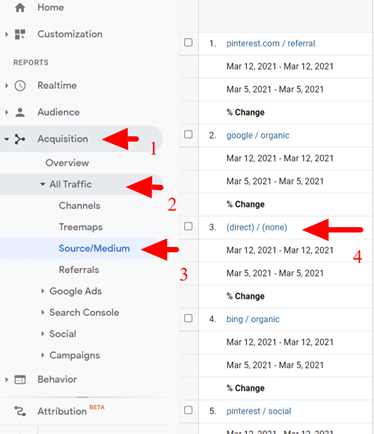
Once that report opens it can be further defined by a secondary dimension. For analyzing this data set, we only looked at the destination page.
To find this data, open the dropdown list “Secondary dimension”, click on “Behavior”, then scroll down to “destination page.”
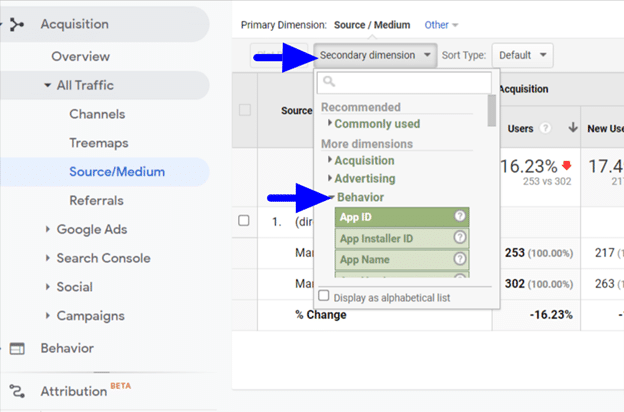
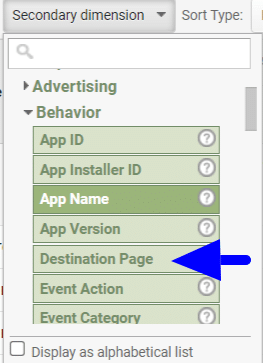
It will bring up the data listed highest to lowest.
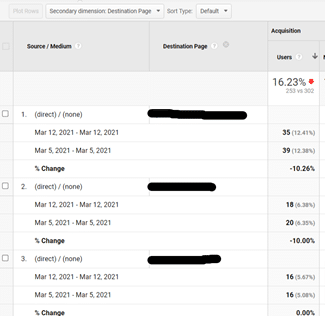
Beth knows that these 3 posts are her top posts in Pinterest referrals, and the top one is not ranked on Google in the first page, so these referrals most likely come from Pinterest. It still needs to be confirmed.
Jetpack Data
The next place she was able to check was Jetpack stats. Jetpack is a plugin that offers a suite of products that range from site stats to security and just about everything in between. It has gotten a bad reputation for slowing down sites and if one were running the entire suite of products, it is possible that it could.

Like most food bloggers, Beth uses other plugins for security, site speed, CDN, and backups. Beth has never run anything from Jetpack’s suite of products besides Askimet Spam, site stats, and their email subscription features. When she lost her entire email list during a theme upgrade, she stopped using the email feature and went with ConvertKit.
The only thing she uses Jetpack for now is Askimet Spam and site stats.
During an audit with Casey Markee he commented that he did not think Jetpack was slowing down her site.
Like most bloggers who run ads, Beth had a problem with Cumulative Shift Layout (CSL). AdThrive offers a CSL optimization setting. Once she turned on the optimization, her site speed runs in the high 90s on most pages, even with Jetpack running in the background.
We need to mention that Jetpack stats are not accepted by any of the advertising management companies because it is believed that the traffic reported is inflated. What we have found is that Beth’s Jetpack reported traffic is less than the traffic reported by Google Analytics.
Beth uses Jetpack as a secondary source for tracking traffic for several reasons:
- A rough estimate of pageviews is located on the dashboard of the blog.
- A quick glance at the dashboard can tell her which pages are receiving the most pageviews that day. This is a great to see if anything unexpected is trending and allows her to capitalize on any that appear.
- Jetpack gives more detail and offers some insights into where the “direct traffic,” as reported by Google Analytics, comes from.
- Jetpack shows her when other sites have sent referral traffic. It gives her an opportunity to catch spammy sites that have used her photos or recipes in a manner not consistent with the blanket rights policy she has in her disclosure statements.
- The best use of Jetpack stats recently is that they serve as an early warning sign to potential problems. This is how she was able to figure out where all this new “direct traffic” being reported by Google Analytics was coming from. As you can see in the graph, this new traffic is coming from the WordPress Android app. Upon expanding that area, she can see that 100% of those referrals have come from Pinterest, just through an Android app.
Jetpack and Google Analytics Data Not the Same
Jetpack and Google Analytics (GA) will never line up exactly. In most cases, Jetpack tends to report higher than GA. Beth has found the opposite to be true for her: Jetpack is reporting lower pageviews than GA. But, these numbers are close enough to verify her suspicions that the new direct traffic reported in GA was linked to a change in the way Pinterest pageviews were being reported in GA. The Jetpack report shown above is from the same day as the GA reports shown below.
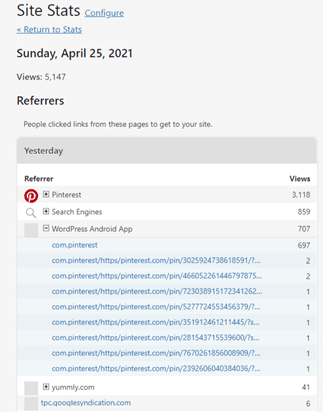
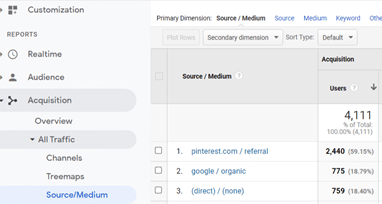
The Jetpack stats of 3,118 Pinterest referrals on the top line includes every Pinterest channel. Those could appear on GA as pinterest.com / referral, pinterest.com / social, pinterest.com.au / referral, and the list goes on. If you have looked at your GA recently, you know that Pinterest referrals come in as many different referrers. Jetpack lists them as one referrer except for those being tracked as WordPress android app.
We know the Jetpack organic traffic stats (859) are higher than the GA google / organic stats (775). That happens because Jetpack bundles all organic traffic into one, which includes Bing, Yahoo, and others. GA only counts Google referrals.
The important number we want you to look at is the WordPress Android App data of 707. When that tab is expanded, it shows us that all 707 pageviews that day were Pinterest referrals.
Google Analytics shows 775 Direct referrals. These numbers are close enough that it would be fair to say that a good portion of what GA is reporting was from Pinterest. Remember, we mentioned earlier in this article that Beth’s Jetpack stats run lower than Google Analytics stats.
What does this mean for your blog?
We hope that you will do your own deeper dive into your Google Analytics to see if there has been an increase in direct traffic to your site that correlates with a decrease in Pinterest traffic before assuming that your Pinterest referrals are down.
It could be a Pinterest problem, but it is best to make sure that it is a Pinterest problem before changing your marketing strategies on this platform, or worse, give up on Pinterest completely. We are sure that for some of you, this drop in Pinterest referrals may be a change in the way the data is being reported by Google Analytics.
If you would like one of us to help you investigate your Google Analytics, Search Console, or assist you one-on-one with any recipe site or blogging issues you may have, reach out to use to schedule an affordable 30-minute coaching session.
There has been much chatter about the drop in referral traffic from Pinterest lately. While there has been a slight decrease in referral traffic, it may not be as bad as you think. Let’s talk about the data we are seeing in our Google Analytics.
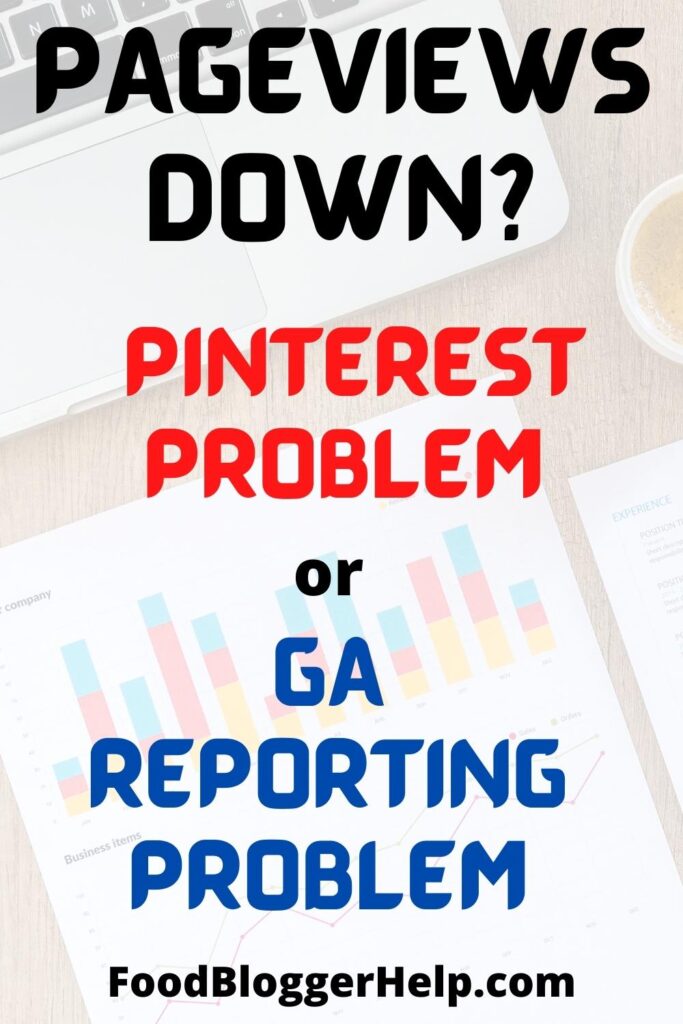
Leave a Reply